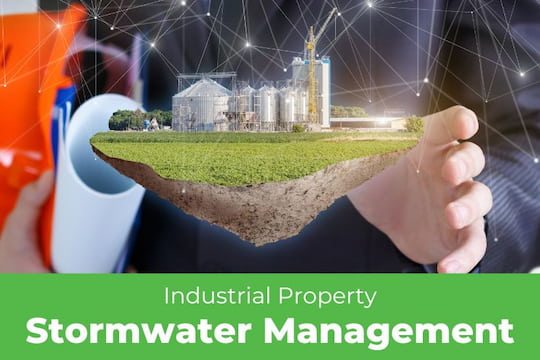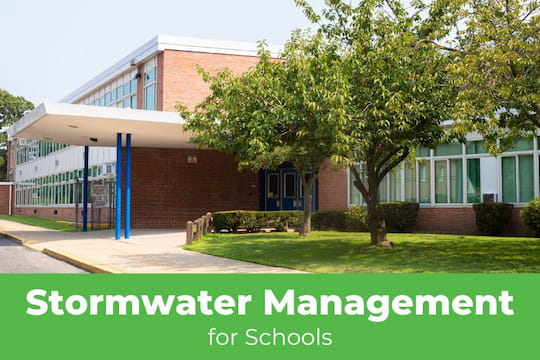Effectively managing stormwater serves many vital purposes, such as creating a cleaner environment, protecting aquatic life, preserving roads, bridges, and other infrastructure, and increasing public safety.
Retail centers present additional challenges for stormwater management because of their high vehicle and foot traffic, large amounts of impervious surfaces, and usage of chemicals and other substances, depending on the types of retail tenants.
The following challenges demonstrate retail centers' unique stormwater management needs and some of the best practices and maintenance tasks that can minimize these issues.
Challenges for Retail Center Stormwater Management

Flooded retail parking lots from clogged stormwater drains can drive away customers, and the standing water can lead to soggy, eroding landscaping. If not remedied, pooling rainwater can undermine paved surfaces and building foundations over time. Conversely, vast concrete surfaces with drainage to help the water run off create another set of issues.
Large Impervious Surfaces
Large amounts of impervious asphalt and concrete surfaces in retail centers prevent water from soaking in the ground where it lands. This action contributes to increased runoff and erosion into lower areas during storms. The runoff carries sediment, trash, and other pollutants into surrounding waterways, and high volumes of uncontrolled or polluted rainwater can disrupt wildlife downstream.
This debris and pollution can significantly affect aquatic life and water quality in local streams, rivers, and lakes, which is why retail centers must have effective stormwater management plans in place.
Increased pollutants from Parking Lots and Customer Traffic
Heavy car traffic and customers spending time in retail centers increases the number of surface pollutants, including oil, hydrocarbons, grease, and other chemical residues from cars. Customer foot traffic may result in increased garbage, such as discarded fast food wrappers and cups, that find their way into the center's storm drains and cause clogging. Additionally, depending on the types of retail businesses in the center, residues from leaking trashcans or garbage from dumpsters with lids left open during a rainstorm can cause or contribute to polluted runoff.
Chemicals and Other Toxic Substances
Retail tenants such as car repair shops can potentially increase pollution if they do not manage their business's chemicals and waste by-products. Some companies may also do activities such as power-washing their trucks, adding more pollutants to water that runs into the storm drains.
Some jurisdictions have stormwater regulations requiring measures such as oil-water separators for auto repair and similar businesses. However, if separators do not receive regular maintenance and cleaning, they may not work as effectively.
Retail centers also frequently use chemicals to maintain the landscape, such as fertilizers and pesticides. Some centers spray chemical repellants for insects and rodents around the outside perimeter of buildings to prevent pest infestations. Stormwater runoff can pick up these chemicals and wash them into nearby water bodies.
Space Limitations for Infrastructure
Some of the devices used in stormwater management for retail centers require open space. Retail centers are frequently developed in smaller areas without enough room to accommodate retention ponds and other stormwater system infrastructure, presenting another challenge in effectively managing stormwater.
Best Management Practices (BMPs) for Retail Centers
Installing Permeable Surfaces
Retail centers can reduce stormwater runoff using permeable pavement, brickwork, and similar surfaces for parking lots and walkways. These surfaces allow rainwater to soak through and sink into the soil, where it falls instead of running off to the lower ground. Pollutants filter out of the rainwater as it soaks through the porous surfaces and soil.
This solution can help recharge groundwater stores, reduce a center's overall runoff, reduce erosion, and minimize the number of pollutants coming from the center and washing into local bodies of water.
Installing Green Infrastructure

Including green infrastructure in a retail center's design or upgrading the landscaping to include these features can reduce runoff entering waterways. For example, a retail center's green infrastructure can include rain gardens, green roofs, and bioswales. These features can increase the attractiveness of the center's common areas while providing a more effective way to capture and treat stormwater runoff.
Implementing an Effective Maintenance Plan
Regular maintenance of stormwater infrastructure goes a long way toward ensuring that the system continues working as it should. A well-rounded maintenance plan should include regular inspections, cleaning of catch basins and drainage pipes, vegetation control, necessary repairs, and other steps that depend on the types of devices in the specific system.
Educating Employees and Customers
Educate retail center employees and customers on the importance of how stormwater management for retail centers can reduce issues and pollution risks. Signage in parking lots and walkways can reinforce good behaviors with customers. "No Dumping" labels on storm drain inlets can keep pollutants out.
For example, training employees on spot-cleaning spills instead of hosing them into a storm drain system can improve pollution prevention. Train retail employees on properly disposing trash, cooking oil, chemicals, and other pollutants. Ensure they understand how to prevent or respond to spills, stormwater discharge prohibitions, and wastewater discharge requirements.
Stormwater Maintenance Tasks to Manage Retail Systems
Regular inspections
Minor issues in a stormwater system can quickly become major problems if not addressed promptly. Regularly inspecting the system helps identify and address these minor issues before they cause significant damage. Inspections can cover catch basins, drainage pipes, retention and detention ponds, and any other infrastructure on the property.
Clean and Maintain the Infrastructure
Regular cleaning and maintenance of infrastructure devices such as catch basins and stormwater drainage pipes can help prevent clogs and backups that can trigger flooding or pollution. Regular street and parking lot sweeping can remove debris before it ends up in the stormwater system. Keep a log to track maintenance and schedule it on a routine basis.
Timely Repairs and Replacements
Making repairs and replacing or upgrading damaged or malfunctioning stormwater infrastructure is vital to ensure proper stormwater management for retail centers and to prevent flooding and potential property damage. Consider simple updates like adding signage on catch basins with wording such as "Don't Dump-Drains to Creek."
Proper Hazardous Materials Disposal

Having tenants properly dispose of batteries, chemicals, and other hazardous materials is critical for preventing pollution. Retail centers can provide designated areas to dispose of these materials to reduce the risk of them ending up in stormwater runoff.
Looking to Implement Proper Stormwater Management at Your Retail Center?
Managing stormwater runoff is essential to maintaining retail centers and keeping our bodies of water clean and safe. At CatchAll Environmental, we specialize in providing services to clean and maintain stormwater management systems at retail centers and other commercial properties.
If you want to implement proper maintenance practices, improve stormwater drainage and maintain your stormwater management infrastructure, call CatchAll today for a consultation. We can provide an economical and effective solution by working with you to bring your system to municipal compliance and provide ongoing maintenance to keep it that way. Contact CatchAll today to discover how our stormwater management solutions can benefit your property.













.jpg)


